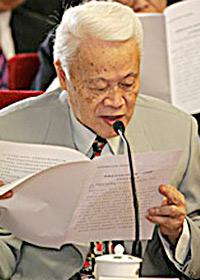| Beijing Review: Between the first drafting of the Basic Law in July 1985 and its adoption in April 1990, how many stages did the law go through?

Xu Chongde: It is hard to differentiate stages of the drafting work. The whole committee was divided into several groups according to different topics, each consisting of members both from Hong Kong and the mainland.
For some groups that discussed sensitive issues involving hot debates, like the political system group I was part of, progress was slower, while some other groups whose tasks were easier finished their work earlier.
What was the split of opinions in the political system group?
There were both disagreements on practical issues and matters of form, such as the titles for government branches and leaders.
Debates on practical issues included the powers of the chief executive of the Hong Kong Special Administrative Region and how the chief executive should be elected.
The split of opinions between mainland members and Hong Kong members was attributable to the different education backgrounds and the two different legal systems in the two places. The Chinese mainland implements a civil law system while Hong Kong has a common law system.
How were the disagreements on the election of the chief executive solved?
After the draft law was publicized in 1989, we carefully considered opinions solicited from the public and discussed further within the group. The majority of the members of the political system group reached the consensus that the chief executive should be elected by a highly representative 800-member election committee.
It is clearly stated in Article 45 of the Basic Law, "The method for selecting the chief executive shall be specified in the light of the actual situation in the Hong Kong Special Administrative Region and in accordance with the principle of gradual and orderly progress.
How do you view the interpretation to the Basic Law made by the National People's Congress Standing Committee on the election of the chief executive and Legislative Council in 2004?
There are two basic messages behind this interpretation. First, the election procedures of the chief executive and Legislative Council will not be changed until 2008. Second, the Central Government has the final say over when the elective procedures will be reformed.
Such interpretations are consistent with the Basic Law and necessary since the law mainly outlines basic principles and excludes regulations on detailed issues. The drafting of the Basic Law is unprecedented in China's legislative history in terms that there was a 12-year gap between the initiation of the drafting and it taking effect.
In a recent speech, you said a hotly debated topic during the drafting of the Basic Law was how to deal with the relationship between the Central Government and the Hong Kong Special Administrative Region Government. How is this regulated in the Basic Law?
I think the Basic Law in some sense is a contract between the Central Government and the Hong Kong Special Administrative Region Government over how much autonomy the latter could enjoy.
But this doesn't mean Hong Kong will no longer be able to enjoy any autonomy outside the Basic Law. We have left some maneuvering space in the law as it is stated in Article 20 that "The Hong Kong Special Administrative Region may enjoy other powers granted to it by the National People's Congress, the Standing Committee of the National People's Congress or the Central People's Government."
A recent example is that Hong Kong was allowed to set up a customs office in the neighboring port city of Shenzhen on the Chinese mainland, where the Hong Kong Special Administrative Region Government will exercise its customs laws and regulations. The Standing Committee of National People's Congress adopted the bill because of the difficulty of setting up a customs office on the Hong Kong side. We expect to see more similar cases in the future. | 